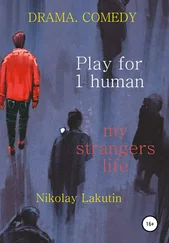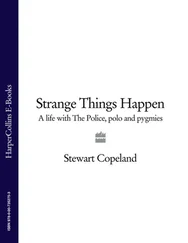Douglas Hofstadter - I Am a Strange Loop
Здесь есть возможность читать онлайн «Douglas Hofstadter - I Am a Strange Loop» весь текст электронной книги совершенно бесплатно (целиком полную версию без сокращений). В некоторых случаях можно слушать аудио, скачать через торрент в формате fb2 и присутствует краткое содержание. Жанр: Прочая документальная литература, на английском языке. Описание произведения, (предисловие) а так же отзывы посетителей доступны на портале библиотеки ЛибКат.
- Название:I Am a Strange Loop
- Автор:
- Жанр:
- Год:неизвестен
- ISBN:нет данных
- Рейтинг книги:4 / 5. Голосов: 1
-
Избранное:Добавить в избранное
- Отзывы:
-
Ваша оценка:
- 80
- 1
- 2
- 3
- 4
- 5
I Am a Strange Loop: краткое содержание, описание и аннотация
Предлагаем к чтению аннотацию, описание, краткое содержание или предисловие (зависит от того, что написал сам автор книги «I Am a Strange Loop»). Если вы не нашли необходимую информацию о книге — напишите в комментариях, мы постараемся отыскать её.
I Am a Strange Loop — читать онлайн бесплатно полную книгу (весь текст) целиком
Ниже представлен текст книги, разбитый по страницам. Система сохранения места последней прочитанной страницы, позволяет с удобством читать онлайн бесплатно книгу «I Am a Strange Loop», без необходимости каждый раз заново искать на чём Вы остановились. Поставьте закладку, и сможете в любой момент перейти на страницу, на которой закончили чтение.
Интервал:
Закладка:
Once I had started up this exchange, we sent messages back and forth across the Atlantic sporadically for a few months, the last one coming from me in late August of that year, just before the kids and I returned to the U.S. It was a fairly lopsided exchange, with me doing roughly 90 percent of the “talking”, doing my best to articulate these elusive, sometimes nearly inexpressible, ideas, and Dan mostly making just brief comments on whether he agreed or not, and hinting at why.
While I was working on the last few chapters of I Am a Strange Loop, I reread our entire exchange, which was roughly 35 pages long when printed out, and although it was not great prose, it struck me that portions of it were worth including in the new book, in some form or other. My musings were extremely personal, of course. They were grapplings by a husband in profound shock after his wife simply went up in smoke for no reason at all. I decided to include excerpts from them here not because I wish to make some kind of grand after-the-fact public declaration of love for my wife, although there is no doubt that I loved and love her deeply. I decided to include some of my musings for the simple reason that they are heartfelt probings that struggle with the issues that form the very core of this book. Nothing else that I have written on the topic of the human soul and human consciousness ever came so much from the heart as did those messages to Dan, and even though I would like to think that I now understand the issues somewhat more clearly than I did then, I doubt that anything I write today can have nearly as much urgency as what I wrote then, in those days of extreme anguish and turmoil.
I decided that since my email grapplings have a different style from the rest of this book, and since they come from a different period of time, I would devote a separate chapter to them — and this is that chapter. In order to prepare it, I went through those 35 pages of email, which were often jumbled, redundant, and vague, and which included sporadic snippets on peripheral if not irrelevant topics, and I edited them down to about a quarter of their original length. I also reordered pieces of my messages and allowed myself to make occasional slight modifications in the passages I was keeping, so as to make the flow more logical. Consequently, what you see here is by no means a raw transcript of my end of our conversation, for that would be truly rough going, but it is a faithful boiling-down of the most important topics.
Although it was a dialogue, I have left Dan’s voice out of this chapter because, as I said above, he served mostly as a cool, calm sounding board for my white-hot, emotional explorations. He was not trying to come up with any new theories; he was just listening, being my friend. There was, however, one point in April of 1994 where Dan waxed poetic about what I was going through in those days, and I think his words make an excellent prelude to this chapter, so I’ll quote them below. All else that follows will be in my voice, quoted (in a slightly retouched form) from my email musings between March and August, 1994.
There is an old racing sailboat in Maine, near where I sail, and I love to see it on the starting line with me, for it is perhaps the most beautiful sailboat I have ever seen; its name is “Desperate Lark”, which I also think is beautiful. You are now embarked on a desperate lark, which is just what you should be doing right now. And your reflections are the reflections of a person who has encountered, and taken a measure of, the power of life on our sweet Earth. You’ll return, restored to balance, refreshed, but it takes time to heal. We’ll all be here on the shore when you come back, waiting for you.

The name “Carol” denotes, for me, far more than just a body, which is now gone, but rather a very vast pattern, a style, a set of things including memories, hopes, dreams, beliefs, loves, reactions to music, sense of humor, self-doubt, generosity, compassion, and so on. Those things are to some extent sharable, objective, and multiply instantiatable, a bit like software on a diskette. And my obsessive writing-down of memories, and the many videotapes she is on, and all our collective brain-stored memories of Carol make those pattern-aspects of her still exist, albeit in spread-out form — spread out among different videotapes, among different friends’ and relatives’ brains, among different yellow-sheeted notebooks, and so on. In any case, there is a spread-out pattern of Carolness very clearly discernable in this physical world. And in that sense, Carolness survives.
By “Carolness surviving”, what I mean is that even people who never met her can see how it was to be near her, around her, with her — they can experience her wit, see her smile, hear her voice and her laugh, hear about her youthful adventures, learn how she and I met, watch her play with her small children, and so forth…
I keep trying, though, to figure out the extent to which I believe that because of my memories of her (in my brain or on paper), and those of other people, some of Carol’s consciousness, her interiority, remains on this planet. Being a strong believer in the noncentralizedness of consciousness, in its distributedness, I tend to think that although any individual’s consciousness is primarily resident in one particular brain, it is also somewhat present in other brains as well, and so, when the central brain is destroyed, tiny fragments of the living individual remain — remain alive, that is.
Also being a believer in the thesis that external memory is a very real part of our personal memories, I think that an infinitesimal sliver of Carol’s consciousness resides even in the slips of paper on which I captured some of her cleverer bon mots, and a somewhat larger (though still tiny) shard of her resides in the yellow lined notebooks in which I have, in the past few months of grieving, recorded so many of our joint experiences. To be sure, those experiences were already encoded in my own brain, but the externalization of them will one day allow them to be shared by other people who knew her, and thus will somehow “resuscitate” her, in a small way. Thus even a static representation on paper can contain elements of a “living” Carol, of Carol’s consciousness.

All of this brings to mind a conversation I had with my mother a few weeks after my Dad died. She said that once in a while she would look at a photo of him that she loved, in which he was smiling, and she would find herself smiling back at “him”, or at “it”. Her comment on this reaction of hers was, “Smiling at that photo is so wrong, because it’s not him — it’s just a flat, meaningless piece of paper.” And then she got very upset with herself, and felt even more distraught over her loss of him. I pondered her anguished remark for a while, and though I could see what she meant, it seemed to me that the situation was much more complicated than what she had said.
Yes, on the surface it seems that this photo is an inert, lifeless, soulless piece of paper, but somehow it reaches her, it touches her. And this brought to my mind the set of lifeless, soulless pieces of paper comprising the complete works for piano of Frédéric Chopin. Though just pieces of paper, they have incredible effects on people all over the world. So might it be with that photograph of my Dad. It certainly causes deep rumblings in my brain when I look at it, in my sister Laura’s brain, and in many others. For us, that photo is not just a physical object with mass, size, color, and so forth; it is a pattern imbued with fantastic triggering-power.
Читать дальшеИнтервал:
Закладка:
Похожие книги на «I Am a Strange Loop»
Представляем Вашему вниманию похожие книги на «I Am a Strange Loop» списком для выбора. Мы отобрали схожую по названию и смыслу литературу в надежде предоставить читателям больше вариантов отыскать новые, интересные, ещё непрочитанные произведения.
Обсуждение, отзывы о книге «I Am a Strange Loop» и просто собственные мнения читателей. Оставьте ваши комментарии, напишите, что Вы думаете о произведении, его смысле или главных героях. Укажите что конкретно понравилось, а что нет, и почему Вы так считаете.












